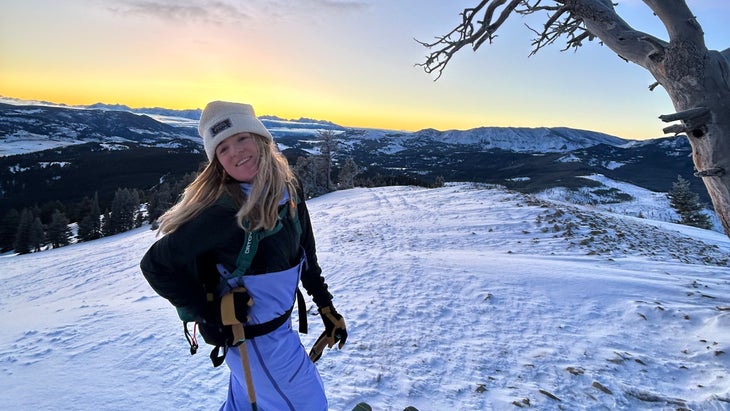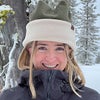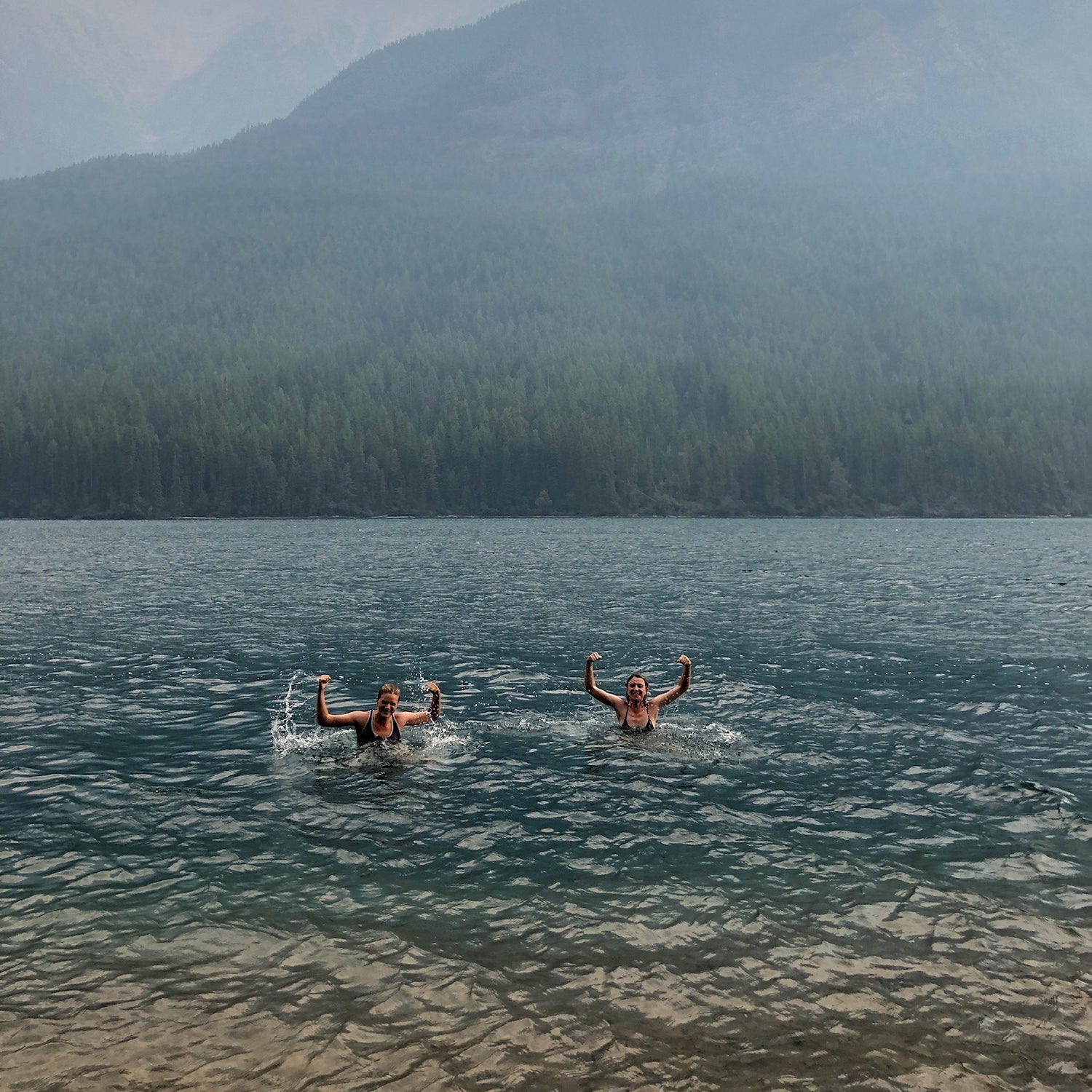I got dumped last April. Technically, we were never really together—in the blurred lines of the dating world today, we were exclusive, meaning we weren’t seeing anyone else, but he refused the title “boyfriend.” After three months of acting like he was my boyfriend, he did what everyone is frustratingly entitled to do—he changed his mind.
When something like this happens, I turn to the women in my life. First I called my sister, Cricket. There’s nothing more validating than hearing her tell me I’m smart and beautiful and deserving of love. After her I spoke to my friends. I live in Bozeman, Montana, with two wildly independent, hilarious women, and our stories of dating ski instructors, hunters, and backcountry firefighters could easily fill a book. Finally, I reached out to my mom, Kris, who reminded me that there is in fact a book that explores the frustrations of dating this type of man—a book written by one of my literary heroes. As I cried, my mom said, “Just think of all the duds Pam Houston dated.”
, Houston’s 1992 debut, is a collection of fictional stories based on her personal experiences in the American West. My mom gave me her copy a few years ago, just before I went through my first real breakup. The stories are written from the perspectives of various brave, smart women, all of whom pursue relationships with wild men. There’s a reckless river junkie who puts the narrator’s life in danger on a Class V rapid, a bristly hunter who one woman follows deep into the woods of Alaska, and a sweet rancher who takes a woman dancing. The men in the book, too unrestrained to settle down, never commit to the narrators and eventually leave them feeling empty. I am familiar with the scenario.
Thirty-one years after it came out, Cowboys still feels relevant, perhaps even more so than when it first appeared. These days women fill mountain towns, attracted by the lifestyle that comes from living near ski resorts, raging rivers, and formidable crags. We feel more welcome in these outdoor communities than our predecessors did decades ago. Some of us are also attracted to the men who live in them; for better and worse, I’m personally drawn to the ones who refuse to settle down. And like Houston’s characters, I often surrendered my power in a relationship, sacrificing my wants and needs to the man in my life. One of my salvations is Houston’s writing. Her books are a reminder to define myself by my own untamed nature, not by the flaky men I date.
“Men are always excused for loving the wilderness or loving adventure or loving whatever more than the woman,” Houston said. “Women aren’t excused for that.”
My brushes with single life have come during time spent in mountain towns, specifically in Santa Fe, in Truckee, and now in Bozeman. These are places ripe for the pursuit of skiing, mountain biking, camping, and other outdoor passions. Alas, they’re also places where Houston’s cowboys are primarily what’s on the dating menu. This definition of cowboy isn’t a man who uses a lasso and rides a horse; it covers any guy who’s fantastically skilled at exactly one outdoorsy pursuit and emotionally unavailable. He can be a fly guide, a ranch hand, a mountain-bike mechanic, or a semipro athlete who works construction in the summer. These kinds of cowboys are very much still around, and I can’t get enough of them. My mother isn’t thrilled about it.
An avalanche of websites and social media posts tell women that our situation has improved in traditional heterosexual relationships. Men are more tuned in to their emotions, and women no longer feel the old pressures to marry in their twenties. We have funny new lingo to help us understand dating pitfalls, terms like breadcrumbing, exclusive, and, of course, ghosting. (Breadcrumbing means to lead somebody on with small, inconsistent validations that ultimately go nowhere. If you didn’t already know that, congratulations.) In a mountain town, the lopsided ratio of men to women places power in women’s hands—allegedly. So why have I and almost all my girlfriends experienced the same “heterosexual blues” again and again? (That term is from a review of Cowboys, by the way.)
In fact, as I reread Houston’s collection for the seventh time after my April breakup, I had a new question: Has nothing changed for women in mountain towns? In October, I called her to discuss the dynamic—and to find out if the cowboys she wrote about decades ago will ever change.
In some ways, we agreed that the expectations placed on men and women have not shifted dramatically since the nineties. By and large, men will always be forgiven for perfecting their sports or risking their lives outdoors. Usually, women don’t get the same slack. After big-mountain skier Hilaree Nelson died on 26,781-foot Manaslu in 2022, some online commenters criticized her because she left children behind.
“Men are always excused for loving the wilderness or loving adventure or loving whatever more than the woman,” Houston said. “Women aren’t excused for that, even though I know many, many women for whom all their major life decisions are based on how much they want to be outside and how much they want to be free to do their sport.” That perspective rings true: I still feel compelled to elevate my relationships over my outdoor passions, and I’m privileged to be surrounded by progressive, feminist friends and family.
But there’s one major difference between the nineties and today. Houston told me that she remembers thinking back then: I don’t want to be as good as them—I just want to be good enough so they don’t notice I’m here. “That’s not someone who wants to be president or summit a mountain,” she told me. “It’s someone who doesn’t want to threaten the egos at the top of the food chain so they get to participate.” Houston said that in those days she didn’t want men to feel like they’d compromised their outdoor experience by inviting her along. Thirty years later, she laments the mindset. “That was me saying those words, making those choices, and not saying, ‘Fuck you. I ski better than you,’ ” she said. “Here I am at 61 and I’m like, What? How many diminishments are there in that one sentence?”
Houston’s comments remind me of the opportunities I now have in the outdoors—ones that previous generations of women may have lacked. Today, when I ski at Bridger Bowl, I’m usually joined by four or five girlfriends. We don’t think twice about bombing down slopes faster than the dudes. We don’t compete with each other when we’re skiing together, because we feel secure in our own abilities. I credit this to Houston and the other women who entered male-dominated outdoor spaces decades ago.

Since publishing Cowboys, Houston has written six books and hundreds of essays—many of which have nothing to do with men. After it came out, she bought a ranch in Creede, Colorado, and then became something of a cowboy herself. Her 2019 memoir, Deep Creek: Finding Hope in the High Country, is also a favorite of mine; in it she recounts her struggles and ultimate success buying and maintaining her own land.
At one point in the book, Houston talks to two young women in the thick of dating. One asks Houston how she learned to retain her independence in relationships. Houston responds: “I realized I could make my own life. I could have my own ranch. I finally realized I could be the cowboy.” The scene reminded me of the times when I gave my power away to a partner. Times when I didn’t share my opinion for fear he wouldn’t like it. I was also reminded of the times I did voice an opinion and got a negative reaction.
After each breakup, I realized it didn’t really matter what I said or whether I voiced my feelings. Reading Houston helped the fog lift and reminded me that what I love most about myself has nothing to do with how men react to my opinions. I’m the cowboy I’m in love with.
Last spring I helped edit a new essay Houston wrote for �����ԹϺ���. At the time, I was still trying to get past my April breakup. Her piece, “Ride the Good Witches,” reminded me of my own wildness and how much I cherish it, despite the persistent worry that maybe I’m not interesting or funny or smart enough. It’s about Icelandic horses, which Houston has been riding—in Iceland—in pursuit of physical and spiritual reawakening after a terrible struggle with long COVID. The horses reminded her of the freedom that still exists in us all.
My eyes watered when I read a few lines that described how she could never ask a rowdy mare to fully trust her, because that would mean giving away part of herself. “I want her to trust me just enough so we can go fast together, but never so much that her dauntless spirit is true to anything but itself.”
While I’m not as fierce and steadfast as an Icelandic horse, I too have a dauntless spirit I can’t afford to lose—and I’m sure a cowboy in a mountain town feels the same way. And sometimes women who pursue outdoor passions need reminding that we also deserve to cultivate our wildness. So fuck you, cowboy, I ski better than you.
Sometimes women who pursue outdoor passions need reminding that we also deserve to cultivate our wildness.
I first read Cowboys in 2019, just before my five-year college relationship came to an end. Back then the lessons I learned had little to do with men. Instead, the characters were living the life I wanted—but at the time I had moved to New York City to be near my then boyfriend. I related to the tales of heartbreak, but also got upset that I wasn’t running Class V rapids or schlepping through grizzly territory. The book made me crave that freedom and wonder what it would feel like to be that wild.
I quit my New York job, landed at �����ԹϺ���, and moved to Colorado before relocating to New Mexico and finally Montana. These days I spend half my summer nights under big starry skies in the backcountry, and I spend winter days skiing with my girlfriends. I drink beer while floating down rivers alongside boys I have no romantic interest in. I make rash decisions with the little money I earn, like buying an expensive mountain bike that I ride down sketchy trails. At work I edit stories for a magazine and website, a job that has brought me the kind of professional joy I haven’t felt since I was a ski coach in high school. When I’m feeling inadequate, I go car camping alone, and I write about how I think love might be the way I feel when the dusk light makes a lake look splintered against a backdrop of evergreen trees, and that my life has become more than I could ever ask for.
Sometimes it takes a jolt like a breakup (or several) to crack open our hearts and remind us of the important truths. The cowboys I date are fundamentally the same as the ones from 30 years ago—it’s we women who’ve changed. Turns out it’s no longer about the cowboys at all. Houston went through hell and back to realize this after Cowboys was published. And, once again, so have I.


